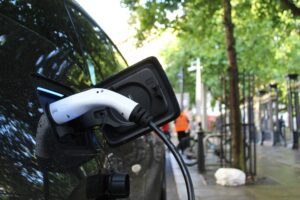ButSpeak.com
News which Matters.

In a monumental breakthrough, charging electronic devices and electric cars at lightning speed is now a reality, thanks to pioneering research led by Ankur Gupta, an assistant professor of chemical and biological engineering at the University of Colorado Boulder. Published in the prestigious journal Proceedings of the National Academy of Sciences, Gupta and his team have unveiled a revolutionary technology that promises to transform the landscape of energy storage.
Gupta’s innovation centers around the efficient movement of ions—tiny charged particles—within intricate networks of microscopic pores. This breakthrough discovery not only accelerates the development of supercapacitors but also enhances their efficiency far beyond conventional battery technologies.
“Supercapacitors rely on rapid ion collection within their porous structures,” explained Gupta, emphasizing their crucial role in advancing electric vehicles (EVs), electronic devices, and optimizing power grids. “Compared to batteries, supercapacitors offer faster charging times and longer operational lifespans,” he added.
Addressing the dynamic energy demands of modern societies, Gupta highlighted the importance of efficient energy storage solutions in reducing waste during periods of low demand and ensuring rapid energy distribution during peak usage times.
“As a chemical engineer, I felt compelled to explore untapped potentials in energy storage technologies,” Gupta shared, reflecting on his motivation. “The primary allure of supercapacitors lies in their rapid charging capabilities. Our breakthrough focuses on enhancing ion movement efficiency—a pivotal advancement in the field,” he noted, as quoted by the journal.
The research also introduces advanced capabilities for simulating and predicting ion flow within complex networks of interconnected pores, a capability that was previously constrained to theoretical models involving single, straight pores.
“This discovery marks a critical leap forward in optimizing supercapacitor performance,” Gupta affirmed. “We’ve uncovered the missing link that enables faster charging and more efficient energy release,” he concluded, underscoring the transformative impact of their findings on global energy storage solutions.